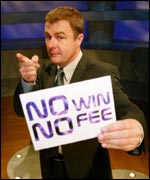No Win, No Fee
Contents |
Host
Broadcast
Hat Trick Productions for BBC One, 29 October 2001 to 29 August 2003 (70 episodes in 3 series)
Synopsis
TV's Mr Cheap Ubiquity becomes ever Cheaper Ubiquity because he's hosting this show for free. That's very kind. Except, of course, he isn't because he's out to get the £4000 daily prize money if the contestants don't win it. How original! We haven't seen anything like that before. Except on Win Beadle's Money.
12 people stand in a semi-circle around Paul and one is picked at random. That player goes into the middle and looks at the two questions on offer. They must decide which one they're going to pick and then, after Ross had read out the question, the player must pick another player who they think will get it wrong. They can study reactions and body language and Paul's recommendations (remember, he always has a vested interest).
The person picked is asked the question again, asked what they're thinking, the first person is asked if they are confident and happy with their choice, the viewer falls asleep, and five minutes later we actually hear the answer to the question. If questionee is correct, they get to sit in one of the six comfy-looking seats of Round two-ality and the questioner is politely asked to piss off but if questionee gets it wrong then he's asked to leave ("I'm pleased to say... you're out.") Repeat five times. Wonder if This Morning are still doing the exciting Midday Money?
Round Two, and the players now have to leave the comfy looking seats and get back into positions. The random lights flash again and a player is selected. They must select an opponent without hearing the question. When they're both together they are both asked a question - a correct answer keeps them in the game but a wrong 'un eliminates them. Cunningly, the question is different for nominator and nominated. After the general knowledge question has been read out, Nominator has to guess whether Nominated will get the question correct. Nominated then has to answer the general knowledge question to stay in the game. After each question, zero, one or two people will leave the game depending on the outcome. If there is one person left at the end then they win the £4000, hurrah! But if the last two people manage to knock each other out (Nominator predicting "correct" and Nominated getting the question wrong) then Paul Ross gets to keep the money itself. Hurrah?
Set is minimalist, some chairs around the outside, some circles on floor where people stand whilst answering questions (four in diamond formation meaning irritating choreographed movement for each question). The sound effects remind us of the "ring this number for your free inventors pack" adverts you always see on cheap cable channels.
Problems? There are several. Former contestants have complained that in the initial round they'd much prefer to answer the questions than pick someone to answer them, given the level of the questions. Furthermore, the main premise of Paul Ross winning the money rarely occurs because in most cases the contestants conspire to avoid the required win/lose combination needed.
"Mr Loss" is an affable enough host, and he really comes into his own when speaking up close and personal over the contestant's shoulder, which adds a lovely timbre to his voice.
The big killer of the show is its snail's pace. We're big fans of popular science at Game Show Towers and a game show about body language and stuff is a fine idea - you show us someone who doesn't think they are an amateur psychologist and we'll show them a good therapist - but a serious quiz that lacks pace such as this is very little fun to watch.
Trivia
On the podcast Fingers on Buzzers, Ross seemed to imply that the programme was recorded in two blocks. In the first block, he 'won' only four times, bagging £16,000. In the second block, he won only once, meaning that he got only £4,000 for an entire series of recordings. And that put an end to the viability of the show for all concerned. Ross also revealed that the producers were initially going to refuse him travel expenses and even cups of tea on set, but eventually relented when he pointed out that this didn't usually form part of a presenter's "fee".
Catchphrases
"I'm pleased to say... you're out"
Inventor
Devised by Iain Coyle
Theme music
Richard Hammarton
Videos
The very first episode.


